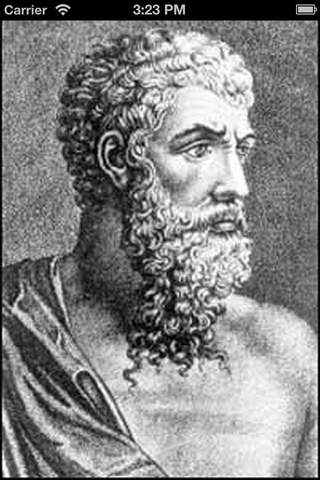
Aristophanes works (with search) app for iPhone and iPad
Developer: Mykola Kuznietsov
First release : 26 Mar 2010
App size: 5.15 Mb
Aristophanes (446 – 386 BC), son of Philippus, of the deme Cydathenaus, was a prolific and much acclaimed comic playwright of ancient Athens. Eleven of his forty plays survive virtually complete. These, together with fragments of some of his other plays, provide us with the only real examples we have of a genre of comic drama known as Old Comedy, and they are in fact used to define the genre. Also known as the Father of Comedy and the Prince of Ancient Comedy, Aristophanes has been said to recreate the life of ancient Athens more convincingly than any other author.
His powers of ridicule were feared and acknowledged by influential contemporaries - Plato singled out Aristophanes play “The Clouds” as slander contributing to the trial and execution of Socrates although other satirical playwrights had caricatured the philosopher.
To simplify study plays of Aristophanes the application supports full text search within all included texts. This is very useful when you need to find a quote or information on a particular subject but dont know where you should looking for.
THIS APPLICATION CONSISTS OF SUCH PLAYS BY ARISTOPHANES:
-The Acharnians;
-The Birds;
-The Clouds;
-The Ecclesiazusae or The Assemblywomen;
-The Frogs
-The Knights;
-Peace;
-Plutus;
-Thesmophoriazusae or The Women Celebrating the Thesmophoria;
-The Wasps;
-Lysistrata.
When Aristophanes first play “The Banqueters” was produced, Athens was an ambitious, imperial power and “The Peloponnesian War” was only in its fourth year. His plays often express pride in the achievement of the older generation yet they are not jingoistic and they are staunchly opposed to the war with Sparta. The plays are particularly scathing in criticism of war profiteers, among whom populists such as Cleon figure prominently.
By the time his last play was produced Athens had been defeated in war, its empire had been dismantled and it had undergone a transformation from the political to the intellectual centre of Greece. Aristophanes was part of this transformation and he shared in the intellectual fashions of the period - the structure of his plays evolves from Old Comedy until, in his last surviving play, Wealth II, it more closely resembles New Comedy. However it is uncertain whether he led or merely responded to changes in audience expectations.
Aristophanes won second prize at the City Dionysia in 427 BC with his first play “The Banqueters” (now lost). He won first prize there with his next play, “The Babylonians” (also now lost).
APPLICATION FEATURES:
-Searchable concordance, search the complete works easily;
-Text resizer with a choice of 12 sizes;
-Automatically remembers last page viewed for each work;
-Option to double-tap page down or scroll;
Landscape mode hides menu bar for maximum reading area.



